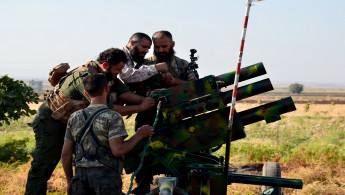Turkey starts 'safe zone' work, despite US reservations
"This area will secure civilians against the attacks of the Syrian regime and the Islamic State group," Davutoglu told reporters.
"I will work with the United State to establish this area, which will also provide shelter to Syrian refugees escaping from the war."
However, in a sign of Turkish frustration at the limited US efforts to train what is known as the moderate Syrian opposition, the Turkish PM added: "Turkish forces would not have to intervene if moderate armed groups were given enough power."
CNN Turk quoted Feridun H Sinirlioglu, the undersecretary to the Turkish ministry of foreign affairs, as saying that his country had agreed with the United States on the conditions of creating a "safe zone" in northern Syria.
Sinirlioglu reportedly said the two countries agreed to designate a 98km by 45km area, to be patrolled by the Free Syrian Army (FSA), who would allow US and Turkish forces to hit IS or Kurdish forces if they entered the area.
Mixed messages
However, Mark Toner from the US State Department denied any such agreement.
"We've been pretty clear from the podium and elsewhere saying there's no zone, no safe haven, we're not talking about that here," he said.
"What we're talking about is a sustained effort to drive ISIL [another name for IS] out of the region."
| There's no zone, no safe haven, we're not talking about that here - Mark Toner, US State Dept |
The head of the FSA's Supreme Military Council, General Mustafa al-Sheikh, believes that the proposed area cannot really be described as a buffer zone.
"A buffer zone in its political meaning should be protected by an international decision, which practically means a decision to topple the Syrian regime. Such a decision does not currently exist due to the lack of serious agreements between the United States and Russia," Sheikh told al-Araby al-Jadeed.
However, Sheikh does believe that Turkey will use its fight against terrorism, "which no state can object to" to push ahead with its plan, hoping for eventual American support.
The Obama administration will want to score domestic points by supporting moderate Syrian opposition forces, Sheikh reasoned.
Redeployment
According to Alexander Ayyub, a researcher at the Omran Center for Strategic Research, despite repeated American attempts to avoid making public commitments regarding such a "safe zone", Turkey is working on multiple levels to establish this area as it relates to its national security.
"Turkey is adamant [in wanting] to establish this area as soon as possible and it is preparing for a large FSA force of 15,000 fighters - including a Turkmen battalion - to operate in the area," said Ayyub.
"The Nusra Front have retreated from the area after receiving Turkish signals, and the Jund al-Aqsa group, which is labelled as an extremist group, will do the same. The Ahrar al-Sham movement has also been asked to reposition its forces outside the area."
The stated purpose of the area will be to fight IS and prevent the expansion of Kurdish groups towards Turkey. Another battle front might, however, be opened in Aleppo to expand the "safe zone" and impose new conditions for a political resolution of the Syrian conflict, said Ayyub.
The Ahrar al-Sham group welcomed the proposed Turkish "safe zone", which the group described as being "in the interest of both countries".
Other armed Syrian opposition groups including Jaish al-Islam have also expressed their support for the Turkish proposal.



